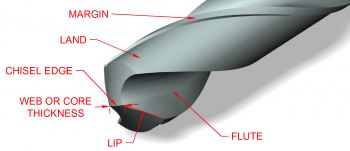The first rule of drilling holes in hardened material is to avoid drilling in hardened material. Seriously.
Plan your work ahead of time. Always drill before hardening.
There are basically three types of metals used for drilling. HSS, Cobalt based, Carbide based.
HSS works well for wood and mild metals. Cheap.
Cobalt works well for nearly everything else - except hardened steel or other very hard metals. More expensive but probably best value for length of life cycle.
Carbide is used for drilling hardened metals of other materials that dull Cobalt or HSS too fast. Carbon fiber comes to mind.
Find a drilling chart that shows RPM's vs diameter vs material. Use that as a guide to set up your drill press speeds. When drilling with carbide, double the speed (RPMs) suggested for HSS.
Use cutting/drilling lube when drilling - always. It will greatly improve the life of your drill bits and give you cleaner, rounder holes.
Carbide drills will not tolerate bending like HSS or Cobalt drills. Using the same hand holding technique for carbide drills will get you broken or prematurely failed drills. Clamp your work down when using carbide or buy extra drills when you break them. Avoid using carbide drills in a hand drill or you will have a great collection of expensive broken carbide drills.
There are different styles of drill bits, ie: spade, straight flute, carbide tipped, helical, etc. Use the right style for the job. Just because it is carbide or carbide tipped doesn't mean it is going to work well, or at all.
Carbide drills or tools are commonly used in CNC applications where the feeds and speeds are precisely calculated and applied. Hand drilling hardened materials with a drill press requires attention to technique by always clamping, RPMs and pressure applied. Applying light pressure to "save wear" on a drill bit is probably the best way to dull a drill bit.
Something to keep in mind. CNC machining defines how tools are made and used today. Knife makers generally use drill presses and hand made craftsmanship. These are often two different things.
Plan your work ahead of time. Always drill before hardening.
There are basically three types of metals used for drilling. HSS, Cobalt based, Carbide based.
HSS works well for wood and mild metals. Cheap.
Cobalt works well for nearly everything else - except hardened steel or other very hard metals. More expensive but probably best value for length of life cycle.
Carbide is used for drilling hardened metals of other materials that dull Cobalt or HSS too fast. Carbon fiber comes to mind.
Find a drilling chart that shows RPM's vs diameter vs material. Use that as a guide to set up your drill press speeds. When drilling with carbide, double the speed (RPMs) suggested for HSS.
Use cutting/drilling lube when drilling - always. It will greatly improve the life of your drill bits and give you cleaner, rounder holes.
Carbide drills will not tolerate bending like HSS or Cobalt drills. Using the same hand holding technique for carbide drills will get you broken or prematurely failed drills. Clamp your work down when using carbide or buy extra drills when you break them. Avoid using carbide drills in a hand drill or you will have a great collection of expensive broken carbide drills.
There are different styles of drill bits, ie: spade, straight flute, carbide tipped, helical, etc. Use the right style for the job. Just because it is carbide or carbide tipped doesn't mean it is going to work well, or at all.
Carbide drills or tools are commonly used in CNC applications where the feeds and speeds are precisely calculated and applied. Hand drilling hardened materials with a drill press requires attention to technique by always clamping, RPMs and pressure applied. Applying light pressure to "save wear" on a drill bit is probably the best way to dull a drill bit.
Something to keep in mind. CNC machining defines how tools are made and used today. Knife makers generally use drill presses and hand made craftsmanship. These are often two different things.

